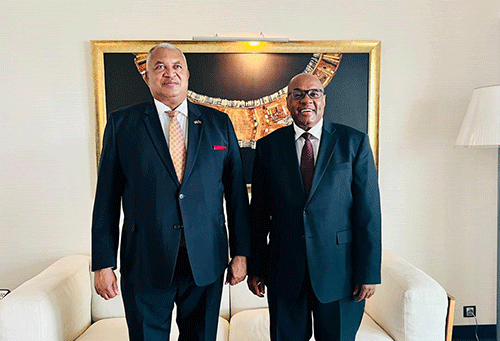Following renewed efforts to strengthen bilateral relations, the Bank of Namibia (BoN) and Banco Nacional de Angola (BNA) recently signed an agreement to formalise technical collaboration and partnership between the two institutions.
The agreement has been hailed by the Governor of the Bank of Namibia Johannes !Gawaxab, and his counterpart Jose de Lima Massano, as a landmark agreement that will not only facilitate sustained cooperation between the two institutions but deepen the historic ties and bonds between the two states.
Under the rubric of the excellent bilateral cooperation between the two neighbouring countries, the two central banks have prioritised trade facilitation through payment system integration enabled by digital capabilities as a means of realising the efficient movement of goods and services between the two countries.
In this regard, the institutions have agreed to focus on effective utilisation of the existing regional cross-border payment systems as well as exploring retail payment options such as prepaid cards for the payment of goods and services. Other solutions being explored are trade related guarantees between the banking institutions of the two countries.
“Another strategic focus area of the partnership is the elimination of revenue leakages for the respective countries by providing timely and accurate data and empirical evidence in terms of misaligned trade data to the detriment of revenue mobilisation. The collaboration will involve the sharing of data and research into trade and related financial transactions for mitigation efforts. Furthermore, sharing of knowledge on financial inclusion initiatives will be prioritised to ensure that the peoples of both countries have access to quality, affordable and a broad spectrum set of financial services,” read a statement from BoN spokesperson Kazembire Zemburuka.
Although both countries acknowledged that the defunct currency conversion agreement which previously allowed the exchange of currencies at the border towns was beneficial, the two central banks have ruled out the activation of this conversion agreement at present as more convenient and cost-effective methods to facilitate trade are being prioritised.
Meanwhile, a technical committee has been formed with institutional arrangements in place to ensure the agreement is fully executed. The agreement also establishes a bilateral forum for the exchange of technical knowledge and mutual cooperation in cognate central banking functions, which will greatly benefit the two central banks in carrying out their respective mandates.
Said !Gawaxab: “We are making concerted efforts to improve the smooth integration of our payment infrastructure for the benefit of our businesspeople, traders, and citizens. We have no illusions that this will be an easy task but given the lofty expectations of our two governments and the demands of our business community, we must deliver on all fronts. In doing so, we will meet our people’s aspirations and build the Africa we want. We are hopeful that our ties and bonds as a people who share so much more than a border will be strengthened and deepened.”
Outside of the technical discussions,!Gawaxab and his delegation paid a courtesy call to Patrick Nandago, Namibia’s ambassador to Angola, to brief him on the outcome of the discussions.



